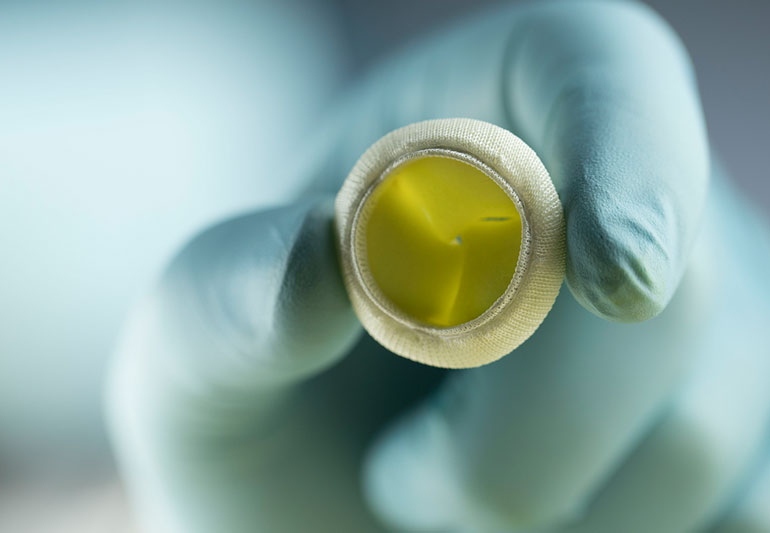

Your heart is your body’s pump — the engine that keeps it going. So when it’s malfunctioning, getting it fixed is critical. If the problem lies with one of your heart’s valves, a surgeon can either repair it or replace it. But how does your doctor decide which is best for you?
“First of all, it’s important to seek treatment early if you suspect you have a heart problem,” says cardiothoracic surgeon Daniel Burns, MD.
“It’s very important that patients go to their doctors early,” he says. “We can treat many heart valve problems with minimally invasive procedures. The earlier patients come to us, the better their outcomes will be.”
If your doctor decides you have a problem with one of the valves in your heart, a surgeon will review your case. “But the question of whether to repair or replace the valve will depend on several factors,” Dr. Burns says.
What can go wrong with your heart’s valves?
Your heart has four valves — mitral, aortic, tricuspid and pulmonary. The valves may have problems from birth, or your lifestyle choices and behavior may prompt a need for surgical intervention later in life.
If a heart valve develops a problem, it likely means it’s either leaking (insufficiency) or narrowing (stenosis). These issues also may develop as you age.
Repair or replace? What to expect for each valve?
Dr. Burns explains what your surgeon will consider when deciding between repairing or replacing each valve.
Mitral valve
Located between the left ventricle and left atrium of your heart, the mitral valve allows oxygen-rich blood to flow from your lungs through the left side of the heart. When it’s working right, the valve opens and closes with each contraction of your heart.
“If your mitral valve leaks, you’ll benefit more from valve repair,” Dr. Burns says. Replacing it can actually decrease your heart function.
Not only does a repair let you keep your own valve, but it improves survival rates and carries a lower risk of:
- Bleeding.
- Thromboembolism, which is a blood clot in a vein or artery.
- Infection.
“Fixing mitral valve narrowing, however, is a complicated task,” Dr. Burns says. It depends on:
- The shape and condition of the valve.
- Blood flow.
- Whether blood clots are present.
- Whether you have atrial fibrillation.
“If complicating factors are present, then replacing the valve is often the best option,” he says.
Aortic valve
This valve connects the left ventricle to the aorta. It allows oxygen-rich blood to flow from the heart to the rest of your body.
Typically, the aortic valve is made up of three cusps or flaps. But some — up to 2% of the general population — are born with only two cusps (bicuspid aortic valve). “This difference forces the heart to pump harder,” Dr. Burns says. People with only two cusps may present with narrowing earlier in life, or may develop an enlarged aorta as well. Aortic valve narrowing is usually caused by calcium buildup or scarring that happens naturally as you age.
It is less common for the aortic valve to leak. But surgeons typically opt to repair a leak if one occurs. Repairing the valve can:
- Decrease the risk of thromboembolism.
- Reduce the likelihood of endocarditis, an infection of the heart’s valves or inner lining.
- Lower the need among young patients for anticoagulant drugs, which thin the blood.
“Your surgeon may consider repairing or replacing a leaking aortic valve if you develop an aneurysm,” Dr. Burns says, which can also inhibit how well your valve functions.
Tricuspid valve
Similar to the mitral valve, the tricuspid valve separates the heart’s right-sided upper and lower chambers. It connects the right atrium to the right ventricle and allows for returning blood to the lungs for oxygenation.
“In most cases, repair often is the best option for the tricuspid valve,” Dr. Burns says. Leaking is the most common problem; narrowing is rare. Replacing this valve is most common in the context of valve infection.
Pulmonary valve
This valve connects the right ventricle to the pulmonary artery. It’s responsible for allowing blood to flow toward the lungs. “The pulmonary valve is less likely to need repair than other valves,” Dr. Burns says.
“Pulmonary valve repair or replacement is rare,” he says. It occurs most often in children born with a heart defect.
When deciding whether to repair your tricuspid or pulmonary valve, your surgeon will consider several factors, including:
- The severity of the disease.
- Your age and overall health.
- Whether you need surgery for any other heart problem.
Repair is typically a better option, he says, because it:
- Decreases infection risk.
- Preserves and maximizes heart function.
- Reduces long-term need for blood thinners.
- Improves survival, both short-term and long-term.
What to expect with a valve replacement
Heart valve replacement involves either open-heart surgery or a minimally invasive procedure. It will depend on the particulars of your case. There are two categories of replacement valves: mechanical and biologic. Mechanical valves have excellent long-term durability, but require lifelong use of blood-thinning medication. Biologic valves don’t require blood thinners long-term, but they are not as durable.
“In most cases, you’ll need a new replacement every 10 to 15 years,” Dr. Burns says.
Talk to your doctor if you have questions about whether heart valve repair or replacement is best for you.
more recommended stories
 AI Predicts Chronic GVHD Risk After Stem Cell Transplant
AI Predicts Chronic GVHD Risk After Stem Cell TransplantKey Takeaways A new AI-driven tool,.
 Rising Measles Cases Prompt Vaccination Push in NC
Rising Measles Cases Prompt Vaccination Push in NCKey Highlights 15 confirmed Measles cases.
 High-Fat Diets Cause Damage to Metabolic Health
High-Fat Diets Cause Damage to Metabolic HealthKey Points Takeaways High-fat and ketogenic.
 Chronic Brain Compression Triggers Neuron Death Pathways
Chronic Brain Compression Triggers Neuron Death PathwaysKey Takeaways Chronic brain compression directly.
 Texas Medical Board Releases Abortion Training for Physicians
Texas Medical Board Releases Abortion Training for PhysiciansKey Takeaways Texas Medical Board has.
 Needle-Thin Brain Implant for Layer-Specific Brain Research
Needle-Thin Brain Implant for Layer-Specific Brain ResearchKey Takeaways Researchers have developed a.
 Pancreatic Cancer Research: Triple-Drug Therapy Success
Pancreatic Cancer Research: Triple-Drug Therapy SuccessKey Summary Spanish researchers report complete.
 Immune Cell Epigenome Links Genetics and Life Experience
Immune Cell Epigenome Links Genetics and Life ExperienceKey Takeaway Summary Immune cell responses.
 Chronic Pain Linked to CGIC Brain Circuit, Study Finds
Chronic Pain Linked to CGIC Brain Circuit, Study FindsKey Takeaways University of Colorado Boulder.
 High-Intensity Training and Oxidative Stress Insights
High-Intensity Training and Oxidative Stress InsightsNew Evidence Linking High-Intensity Training and.

Leave a Comment